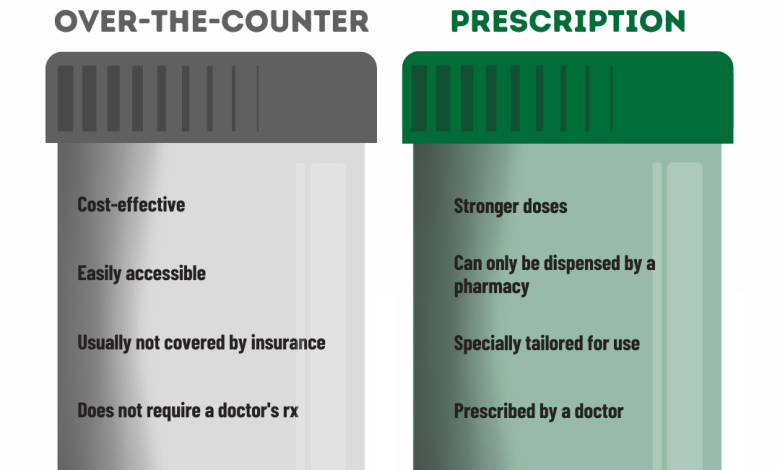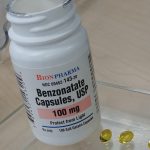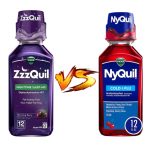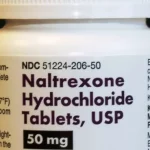6 Differences Between Over-The-Counter (OTC) and Prescription Medications

Medications are an essential part of treating illnesses and improving our health. They come in different forms, such as tablets, capsules, injections, and creams, and are available in two main categories: over-the-counter (OTC) and prescription medications. While both types of medication serve the same purpose, they differ in several ways, including their availability, regulation, and usage.
According to a study by the Consumer Healthcare Products Association, approximately 81% of adults in the United States use OTC medications as a first response to minor ailments such as headaches, colds, and allergies. According to data from the Centers for Disease Control and Prevention (CDC), approximately 49% of the US population used at least one prescription medication in the past 30 days.
In this article, we will explore the differences between OTC and prescription medications to help you understand which type of medication is suitable for your needs.
Availability
OTC medications are those that are available for purchase without a prescription from a healthcare provider. These medications can be purchased at pharmacies, supermarkets, and convenience stores, and do not require a prescription or any form of authorization. Examples of common OTC medications include pain relievers such as ibuprofen and acetaminophen, cough and cold medications, antacids, and allergy medications.
On the other hand, prescription medications are only available with a prescription from a healthcare provider. They are dispensed by licensed pharmacists, and you must provide a valid prescription to purchase them. Prescription medications include medications for chronic conditions such as hypertension and diabetes, antibiotics, and painkillers.
Regulation
OTC medications are regulated by the Food and Drug Administration (FDA) in the United States. The FDA ensures that OTC medications are safe, effective, and labeled appropriately for consumer use. Before an OTC medication can be sold, it must go through a rigorous approval process, which includes clinical trials and reviews of its safety and effectiveness.
Prescription medications, on the other hand, are also regulated by the FDA, but they are subject to a more rigorous approval process than OTC medications. Prescription medications are only available with a prescription because they are typically more potent and carry a higher risk of adverse effects than OTC medications. Before a prescription medication can be sold, it must go through extensive clinical trials and reviews of its safety and efficacy.
Usage
OTC medications are intended for short-term use to treat minor illnesses or symptoms. They are typically safe when used as directed and are designed to be self-administered. For example, if you have a headache, you can purchase an OTC pain reliever and take it as directed on the label. However, if your headache persists, you should seek medical attention.
Prescription medications, on the other hand, are intended for the treatment of more serious conditions and chronic illnesses. They are typically more potent than OTC medications and may require careful monitoring by a healthcare provider. Prescription medications are tailored to a patient’s specific needs, and the dosage and duration of treatment are determined by a healthcare provider.
Cost
OTC medications are generally less expensive than prescription medications. Since OTC medications do not require a prescription or a visit to a healthcare provider, they are often more affordable and accessible to consumers.
Prescription medications, on the other hand, are typically more expensive than OTC medications. Prescription medications require a prescription from a healthcare provider and are often covered by insurance. However, the cost of prescription medications can vary widely depending on the medication, the dosage, and the duration of treatment.
Potential for Misuse
OTC medications have the potential for misuse, particularly when they are not used as directed. For example, taking more than the recommended dosage of an OTC pain reliever can lead to liver damage or other adverse effects. Similarly, using OTC cough and cold medications can lead to side effects such as drowsiness and dizziness.
Prescription medications also have the potential for misuse, particularly when they are used without a prescription or not as directed by a healthcare provider. Misuse of prescription medications can lead to serious health consequences, including addiction, overdose, and even death. This is why prescription medications are only available with a prescription from a healthcare provider, who can monitor the patient’s use and ensure that the medication is being used safely and effectively.
Potential for Side Effects
All medications, whether OTC or prescription, have the potential for side effects. OTC medications are generally considered safe when used as directed, but they can still cause side effects in some people. Common side effects of OTC medications include stomach upset, dizziness, and drowsiness.
Prescription medications are more likely to cause side effects than OTC medications. This is because prescription medications are typically more potent and are designed to treat more serious conditions. Common side effects of prescription medications include nausea, vomiting, and diarrhea, as well as more serious side effects such as allergic reactions and liver damage.
Conclusion
In conclusion, while OTC and prescription medications serve the same purpose of treating illnesses and improving our health, they differ in several ways. OTC medications are available for purchase without a prescription, are less expensive, and are generally considered safe when used as directed. Prescription medications, on the other hand, require a prescription from a healthcare provider, are more expensive, and are subject to a more rigorous approval process due to their higher potency and potential for serious side effects. It is important to consult with a healthcare provider before taking any medication, whether OTC or prescription, to ensure that it is safe and effective for your specific needs.





